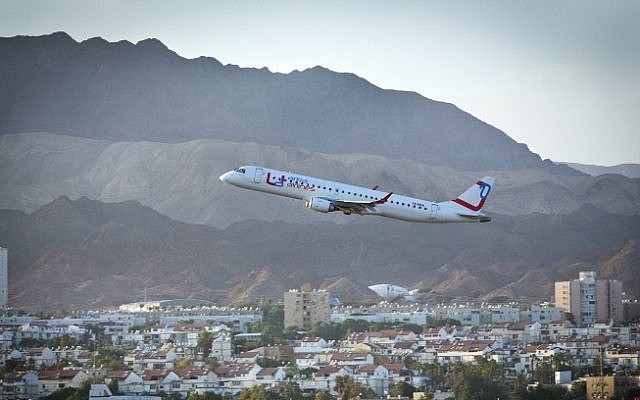Ramon takes over as main airport serving southern resort city; some locals bemoan losing conveniently placed old airport
Eilat airport bade farewell to its final flight on Monday and closed down after 70 years, with all arrivals and departures moving to the brand new Ramon Airport some 19 kilometers (12 miles) north of the resort city.
An Israir ATR-72-500 turboprop took off for Sde Dov airport in Tel Aviv, as darkness fell and the staff began packing up and moving their equipment to the new airport. The single runway is now expected to be torn up and the land will be used for construction.
The conveniently situated city airport opened as a vital lifeline to the fledgling town in March 1949, less than a year after Israel’s founding. It served almost exclusively for domestic flights and was within walking distance of the center of town and many hotels.
In its last year of operation, it saw almost 19,000 aircraft movements on its lone 1,900-meter-long (6,230 feet) runway.
Eilat is expecting a boost in tourism. Initially, Ramon will welcome about two million passengers a year, with plans to expand to 4.5 million.
The new air terminal was inaugurated on January 21 and is seen as a key part of plans to boost tourism to Eilat. It also serves as an emergency alternative to Tel Aviv’s Ben Gurion Airport in times of conflict.
Currently, about 1.4 million Israelis visit Eilat annually and some 300,000 foreign tourists fly in, mainly from Europe.
Ramon began receiving international flights earlier this month. Several low-cost and charter airlines had been flying to Ovda Airport, ferrying vacationers from Europe. Main carriers such as Germany’s Lufthansa are also due to start serving the new airport.
Ramon is the first civilian airport to be built from scratch in Israel since the foundation of the state in 1948. Other facilities have been modified from infrastructure mainly built during the period of the British Mandate.
Eilat city airport and a number of other airfields were initially built to serve the military and not for civilian purposes.
The new single-runway airport is named after Ilan Ramon, Israel’s first astronaut, who was killed in the Columbia Space Shuttle disaster in 2003, and his son Asaf, an Israel Air Force F-16 pilot, who died in a training accident in 2009.
Eilat residents and others responded to the closure of the small city airport, where crowded check-in lines sometimes stretched into the street outside, with mixed feelings.
“Good luck Eilat,” said one Facebook commenter in a post adorned with flags and hearts, but others said: “This is not a time for celebration, it’s a time for tears” and “I don’t know why Eilat’s residents agreed to the close-down, with the airport so conveniently placed and close to the center of town and the hotels. Now people will have to travel 20 minutes by taxi. More money for the taxi drivers.”
At the other end of Eilat’s most frequent air route, Sde Dov, the city’s mayor, Meir Yitzhak Halevi, has been holding a protest against the planned closure of that small airport.
Eilat’s residents, who receive a discount on flights, use Sde Dov to conveniently access the center of the country for quick hops for medical treatments, work and family visits. They fear that with no alternative small airport planned as a replacement, all flights will have to land at Ben Gurion Airport, which is already heavily congested, making their road journey times much longer and far more expensive.
Sde Dov is considered prime real estate in Israel’s most expensive city and some 16,000 housing units are planned to be built on the land in north Tel Aviv adjacent to the sea.
Tel Aviv Mayor Ron Huldai has also objected to the planned closure of Sde Dov and said on Sunday that “the state cannot afford to forego national infrastructure for the benefit of real estate development.”
